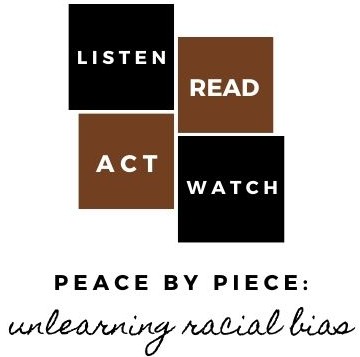This post is part of a year-long series. If my work is helpful for you, consider a contribution through Venmo to support this crucial work of unlearning racial bias.
Last week, I asked how many movies and shows you have seen – besides A Wrinkle in Time – that center a black girl finding her identity? For me, one such movie is The Wiz, the classic all-black version of The Wizard of Oz. When the final scene of the musical begins, our remixed yet still familiar protagonist has just been given the key to going back home to Kansas by Lena Horne or Uzo Aduba, depending on which version you watch. And she ruminates on the meaning of home as she prepares to click her heels and return to the place she took for granted a short time ago. She looks out into the distance and begins to sing, “when I think of home, I think of a place where there’s love overflowing…”

In addition to being a heartwarming family story, The Wiz is layered with social commentary. The scarecrow croons, for instance, that you can’t win, you can’t break even, and you can’t get out of the game: a clear reminder that no matter what black people try to get ahead in their lives, that the deck is always stacked against them. Just a little later, we hear tin man mournfully wonder what he would do if he could suddenly feel. Each time I hear this song, I can’t help but echo its sentiment, musing to myself that if I could express my feeling freely, I’d hardly know what to do with myself because such freedom would be so utterly new.
And of course we can’t forget the lion, who receives the heartfelt advice from Dorothy to “be a lion.” She encourages him to be who he truly is: standing strong and tall, the bravest of them all, admonishing him to keep on trying.
Once old Evilene perishes after having water poured on her, all of her winged warriors dance and sing in jubilation. With their fearsome ruler finally gone, they rejoice as they feel this brand new day. They knew, after all, that they’d one day be free somehow. So we, the audience, resonate with this notion: that we, too, will be free someday.
There’s a plethora of thinkpieces and analyses of The Wiz, which, despite some white people having never heard of it until NBC staged a live production a few years ago, has existed on stage and screen since 1974. The story was so commonly known in the black community I grew up in, that I could confidently sing along with most of the soundtrack even before my sixth grade self was cast in my elementary school’s production as Auntie Em. Since many writers have researched deeply and coherently compiled their musings, I won’t copy their work and add my own voice to the fray. Instead, I’ll share with you why The Wiz is so important to me.
The 1978 film adaptation of The Wiz is star-studded, featuring a hefty sampling of black Hollywood’s finest: Nipsy Russell, Michael Jackson, and Diana Ross, to name a few. It’s beautiful, and imaginative, and dazzling in its adaptation of the classic tale. The Wiz doesn’t so much change its source material as it does breathe new life into it, bathing it in an urban landscape steeped in black culture, amid black icons, to a soundtrack of black music.
Instead of Dorothy looking wistfully over the rainbow and wishing to fly with the birds, the opening number of The Wiz finds Auntie Em reminding Dorothy that she is loved and wanted, that she belongs with her family. The sense of connection and belonging are omnipresent in The Wiz, as Dorothy isn’t so much on a journey to find that leaving home will help her find herself, as she is misguidedly seeking to return to the home where she and her mother lived before her mother died, only to find that her mother wasn’t her only family – and that the familial love she thought she was missing, has been waiting for her patiently all along.
It reminds me in no small way of a phrase our priest uses frequently, referring to the congregation as “beloved.” My first name is a Spanish word that roughly translates to “beloved.” And any time I come across the word in Scripture, I close my eyes and feel a special nudge, a comfort that comes from knowing I am beloved by my Creator. A similar sense of belonging, of home, of connectedness, of belovedness, is the very yellow brick road Dorothy and her friends ease on down throughout The Wiz.
This remixed version of L. Frank Baum’s age-old tale resonates so deeply with me because it is so black, because it is so resonant, because it is so inviting, because it is so familiar, and – of course – because it reminds me of home.
The Wiz, its soundtrack, and its stars are woven throughout memories of my childhood. Truly, when I myself think of home, The Wiz is an integral part of that picture.

I wonder, what do you think of when you think of home? Do you picture big, boisterous family dinners? Do you imagine the ease of finally letting down your guard because your family knows and loves you best? Do you exhale as you fall into familiar patterns of making sure the cook doesn’t have to clean? Is the game on TV? Are the uncles playing a loud game of dominoes on the patio? Has your nephew absconded with all the children’s Easter candy while everyone else was outside playing and he was left unattended?
The love and warmth I feel when I think of home are so thick they are almost tangible. As you think of home and what it means to you, I hope you’ll consider the following questions:
- What kind of home are you seeking to create for yourself? Your family?
- If guests visited a family gathering, would they feel included in your family’s habits and traditions?
- Are your family’s gatherings inclusive? In theory only or in truth?
- What can you add to the soundtrack of your home to ensure your family always feels wanted, welcomed, and knows they belong?
I hope the home from which you hail keeps you firmly rooted and secure, that it steadily beckons you back, welcoming you with open arms. And I hope the home you are building is inclusive, freeing, affirming, and steady. Come back next week, and we’ll keep working to add peace to our lives and our homes, one piece at a time.

